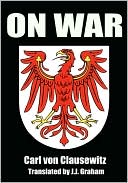

 |

|

The average rating for On War based on 1 review is 2 stars.
Review # 1 was written on 2009-07-07 00:00:00 Carolyn Gleason Carolyn GleasonReviewing classics can be humbling. Some books have passed through so many generations and have been analyzed so thoroughly that they've reached mythic proportions. Only the arrogant or ignorant would criticize them. On War is just such a book. First the disclaimer. I have an amateur interest in military history but do not have the depth to fully appreciate mid-19th century military theory. Regardless, I know enough to appreciate Clausewitz's rejection of formulated tactics and movement. Now for the arrogant and ignorant part. Clausewitz was a Prussian officer who saw action when he was younger and in the Napoleonic campaigns. As an older staff officer he never seemed to hold significant command. His later career was devoted almost entirely to theory. Despite this (or due to this), he is very self-aware as to the distinction between theorist and practitioner:Activity in war is movement in a resistant medium. Just as a man immersed in water is unable to perform with ease and regularity the most natural and simplest movement, that of walking, so in war, with ordinary powers, one cannot keep even the line of mediocrity. This is the reason that the correct theorist is like a swimming master, who teaches on dry land movements which are required in the water, which must appear grotesque and ludicrous to those who forget about the water. This is also why theorists, who have never plunged in themselves, or who cannot deduce any generalities from their experience, are unpractical and even absurd, because they only teach what everyone knows- how to walk. pg. 67-68. Even though Clausewitz's speaks to the uselessness of theorists expounding well-understood concepts, slightly reworded to sound insightful, he does the same. For example: "The only means of destroying the enemy's armed force is by combat, but this may be done in two ways: 1) directly, 2) indirectly, through a combination of combats." Pg. 325 or "The best strategy is always to be very strong, first generally then at the decisive point." pg. 175. Granted, any book can be dissected and sentences taken out of context to give absurd impressions. However, these types of assertions are presented at frustratingly tiring length and repetitiously. Again, to be fair, Clausewitz was a soldier, not a writer. But precisely because of that, I expected Clausewitz to present his ideas with greater clarity and precision. Clausewitz's devotion to articulating simple points may be a rejection of the esoteric theorists of his time. He places great importance on plain meaning. Thus it has come to pass that our theoretical and critical books instead of being straightforward, intelligible dissertations, in which the author always knows knows at least what he says and the reader what he reads, are brimful of these technical terms, which form dark points of interference where author and reader part company. But frequently they are something worse, being nothing but hollow shells without any kernel. The author himself has no clear perception of what he means, contents himself with vague ideas, which if expressed in plain language would be unsatisfactory even to himself. pg. 129. The "hollow kernels" he rejects in the language of others unfortunately feels similar in his own writing. Simple ideas excessively elaborated upon to chapter long expositions don't make them any more insightful. But On War is a classic for a reason. His core ideas, which have given the work its timeless nature, display his modern savviness. Clausewitz, a career soldier, surprisingly supports the subordination of pure military campaign planning to the judgments of political (though martially competent) statesmen. He portrays the military machine as a political tool. The objectives of any combat are either total annihilation of the opponent's fighting force, or more realistically, fighting will. His chapters on defensive combat and protracted campaigns resonate well in the post-Vietnam era as well the current era of fighting ideological groups which may not be defined in geo-political terms. Clausewitz is most compelling in his stress on the intangibles. As he mentions at the end: Now, if anyone wonders at finding nothing here about turning rivers, about commanding mountains from their highest points, about avoiding strong positions, and finding the keys of a country, he has not understood us, neither does he as yet understand war in general in its general relations according to our views.pg. 373. Stochastic efforts such as war require fluidity and brilliance that Clausewitz places front and center. The "moral force" of an army is given considerable discussion as is its leader's character. The combination of cleverness and courage is given considerable importance "(a)s we admire presence of mind in a pithy answer to anything said unexpectedly, so we admire it in a ready expedient on sudden danger." pg. 45. Clausewitz recognizes that maintenance of intellectual acuity distinguishes the leader from the "...subordinate general grown grey in the service, and in whom constant discharge of routine duties has produced a decided poverty of mind, as a man of failing intellect, and, with all respect for his bravery, to laugh at his simplicity." pg. 57. On War has been a military studies staple for generations. Its impact cannot be ignored. But, frankly, the book suffers stylistically and most of the pages are filled with repetitions of straightforward concepts. For the modern reader, who may not be reading it for its pure historical significance, On War (much like this review) is more tedious than enlightening. |
CAN'T FIND WHAT YOU'RE LOOKING FOR? CLICK HERE!!!